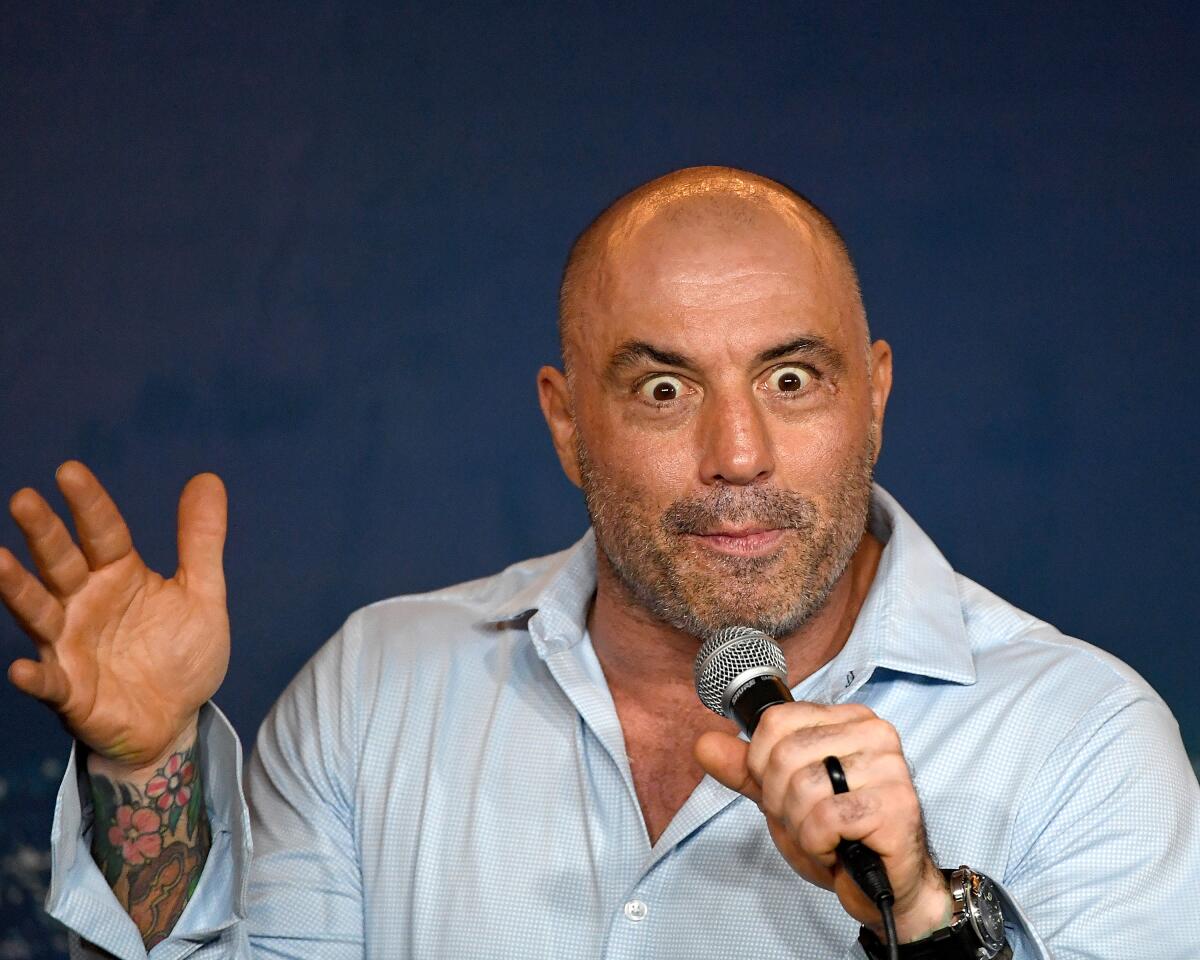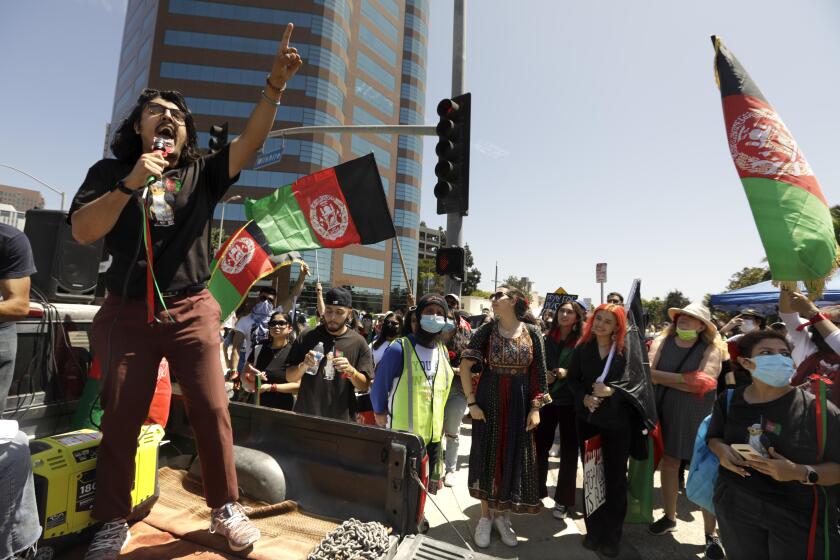This is another article about stuff Joe Rogan has said about the coronavirus. With bonus timeline!

- Share via
If you’re reading this on latimes.com, we’re all friends here, so we can talk about it: If there’s a basic social problem with public health communication, it’s that journalists — like government officials, researchers and hospital administrators — are not especially relatable people in the grand scheme of things. They’re a little more wooden than average, and maybe a little more sour, because they have a fatal obligation to (in theory) try to avoid saying weird stuff that might not be true. They are exiles from the cozy anarchy of casual conversation, where you can sort of ramble on about that time in the woods you definitely saw a UFO. Probably. It would probably be interesting to hear top U.S. virus expert Anthony Fauci tell a UFO story, but it’s probably better for public confidence if he didn’t.
But playing it straight is a drag. Recent survey data shows that most people want to consume journalism that comes from a perspective they share, and they want that journalism to be enjoyable or entertaining. Broadcast programming suggests that your regular Joe Netflix and Jane Fortnite often want their information from people they actually seem to like or at least find interesting (John Oliver, Trevor Noah, any podcast host you can think of on the left; Ben Shapiro, Tucker Carlson, any talk radio personality you can think of on the right). The past few decades of media keep tilting us toward the personality-driven, which is why we now use jargon like “parasocial relationships” to describe the connections we feel with public figures who don’t know we exist. Public figures like Joe Rogan.
Rogan, a longtime media personality and UFC commentator, hosts an incredibly popular podcast on Spotify where he sits around for hours with different guests and just talks about whatever. He’s not what you’d normally classify as a journalist, but he’s a curious, opinionated person who brings on social outliers like comedians, CEOs, scientists, athletes and dissidents of various flavors to (sometimes) drink and smoke on air with him to talk about stuff like artificial intelligence, steroids, politics, sports, war, transgender people — whatever you could talk about if you spent three hours talking, which is anything. It is a recognizable journalism substitute, a pleather that asks questions.
And because so many people listen, what Rogan says matters, sometimes leading otherwise more professionally boring journalists to write about the particular stuff he says that’s controversial or disputable. Like what Rogan says about COVID-19, which is why it was newsworthy when he announced this week that he had contracted the virus while on tour. He said he had “one bad day” of symptoms and is thankfully now feeling better.
Here’s a timeline of previous COVID-19 happenings in Rogan’s world, which is the world a lot of us live in now.
June 12, 2020: In a show with comedian Bill Burr, Rogan criticized lockdowns, saying to “lock down old people and sick people” but to “let regular people do whatever the f— they want, you can’t just lock people’s freedom down for something that killed a small fraction of what you thought it was going to kill.”
July 24, 2020: Rogan announces he’s moving from Los Angeles to Texas for “a little more freedom” and said L.A. had become “overcrowded,” which he called “a real issue when you look at the number of people that are catching [COVID-19] because of this overpopulation issue.”
AI tech used to re-create Anthony Bourdain’s voice in a documentary is already stirring legal, labor and ethical issues — and making Hollywood production faster.
Oct. 27, 2020: Rogan hosts controversial conspiracy theorist Alex Jones, where the pair talked skeptically about vaccines, particularly a polio vaccine.
Oct. 28, 2020: BuzzFeed News obtains an internal memo from a Spotify executive appearing to defend Rogan’s booking of Jones, telling employees that questionable content would be reviewed but that “it’s all too common that things are taken out of context.”
April 23, 2021: Rogan says on his podcast that “if you’re like 21 years old, and you say to me, ‘Should I get vaccinated?’ I’ll go, ‘No.’” Rogan adds: “If you’re a healthy person, and you’re exercising all the time, and you’re young, and you’re eating well, like, I don’t think you need to worry about this.” An uproar ensues.
April 28, 2021: Anthony Fauci, the U.S. government’s top infectious disease expert, responds to Rogan’s comments about young people not needing to get vaccinated in an appearance on the “Today” show. “That’s incorrect… even if you don’t have any symptoms, you’re propagating the outbreak” by infecting others.
April 29, 2021: After blowback, Rogan says, “I’m not an anti-vax person” and that his parents have been vaccinated. “The problem is today everything is all headlines and highlights and it’s all clickbait.” Rogan adds that he says “stupid s—” on the podcast and that “I’m not a respected source of information, even for me.” He also implied he wasn’t vaccinated, saying that he was scheduled to receive the Johnson and Johnson vaccine before that vaccine was temporarily suspended.
June 22, 2021: Rogan hosts Pierre Kory, an ICU specialist and a prominent ivermectin proponent, to talk about the drug’s possible applications for treatment of COVID-19. There’s been no persuasive clinical evidence thus far that the human version of the drug is effective; officials have reported that some people are poisoning themselves by taking the version of the drug intended for deworming livestock.
Aug. 6, 2021: Rogan blasts the implications of vaccine mandates: “You’re moving one step closer to dictatorship. … That’s what’s gonna happen with the vaccine passport, that’s what’s gonna happen if they close borders: You can’t enter New York City unless you have your papers, you can’t go to here unless you have that, you can’t go on a plane unless you do what I say.” Rogan says that vaccinated people “seem to have a better time of it” when they get COVID-19, but Rogan adds, “Where are the people out there calling for people to get healthy? Where are the people out there calling for people to lose weight?”
Aug. 20, 2021: Rogan says Pfizer and Moderna’s highly successful mRNA vaccines are “not really a vaccine in the traditional sense” but “really gene therapy.” Rogan adds, “I’m not saying that people shouldn’t take it. But I’m saying you’re calling it a thing that it’s not … and you’re mandating people take it.” Politifact rates the “gene therapy” comparison as false.
Sept. 2, 2021: Rogan announces his COVID-19 diagnosis on Instagram. “I had a headache, and I just felt just run down. ... [T]hroughout the night, I got fevers and sweats, and I knew what was going on,” the 54-year-old says in a short video. “I got up in the morning, got tested and turns out I got COVID. So we immediately threw the kitchen sink at it — all kinds of meds: monoclonal antibodies, ivermectin ... everything. And I also got an NAD drip and a vitamin drip, and I did that three days in a row.” Monoclonal antibodies are authorized treatments for COVID-19, but the others are not.
Afghan Americans used social media to try to help Afghans escape Kabul. But with the Taliban in charge, the internet is now more dangerous for activists.
More to Read
The biggest entertainment stories
Get our big stories about Hollywood, film, television, music, arts, culture and more right in your inbox as soon as they publish.
You may occasionally receive promotional content from the Los Angeles Times.












